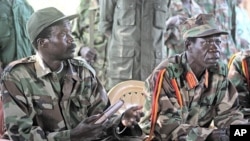South Sudan has deployed hundreds of soldiers to Western Equatoria to root out Lord's Resistance Army (LRA) fighters suspected of carrying out deadly attacks in the state this week, army spokesman Philip Aguer said Thursday.
"There is no other enemy that we are suspecting in the region. It is only the LRA," Aguer told VOA News.
Some 500 South Sudanese soldiers have been deployed to the region to track down the LRA and protect locals, he said.
Officials said two people were killed in the raids in Ezzo and Tamburo counties, and an unknown number abducted. The attackers also looted property, officials and residents said.
Anglican Bishop John Nzawo of Ezzo diocese said one of the attacks happened in "the small village of Naazinga, which is one-and-a-half miles from my diocesan premises."
"One person was killed on the spot and properties have been destroyed and looted. One person was severely injured and he was taken to hospital," Nzawo said.
The attacks, which Nzawo said sent terrified locals fleeing into the bush, came hard on the heels of raids in neighboring Central African Republic (CAR), which have also been blamed on the LRA.
Western Equatoria's Minister of Information Charles Kisanga said South Sudan has been on "high alert" for an LRA attack. The notorious rebel group is reported to have taken advantage of instability in CAR after the violent coup in March that ousted president Francois Bozize, and regrouped.
"There have been reports of LRA activities around the border areas due to the fact that the new government in Central Africa is not very cooperative in dealing with these matters, and they were left to start regrouping. So that is why people have been on high alert in South Sudan," he said.
The LRA has led one of the most brutal and longest armed conflicts in Africa since it was formed in the late 1980s by Joseph Kony, a self-proclaimed prophet who still leads the group.
The LRA's stated aim is to overthrow the government of Ugandan President Yoweri Museveni and replace it with a regime based on the Bible's Ten Commandments.
Its brutal battle tactics, including mass murder, grisly mutilations, and its hallmark tactic of abducting children and forcing them to join the rebellion, either as soldiers or as sex slaves for LRA commanders, have caused it to lose support among local populations.
A 2006 study funded by UNICEF estimated that at least 66,000 children and youth had been abducted by the LRA since it was set up in the 1980s.
At its peak, the LRA was mainly active in northern Uganda and the border area of what was then the southern part of Sudan.
According to the U.S. State Department, Kony ordered the LRA to withdraw from Uganda in 2005 and 2006 and move into the border region of the Democratic Republic of the Congo (DRC), the Central African Republic (CAR), and what is now South Sudan.
Even though the LRA's core group of fighters is thought to have been reduced to around 200 today, the group "retains the capacity to cast a wide shadow across the region because of its brutality and the fear it arouses in local populations," the State Department says.
A report released in December last year by the United Nations blames the LRA for 278 attacks in 2011 and estimates that more than 465,000 people in CAR, the DRC and South Sudan were displaced or "living as refugees during 2011 as a result of the LRA threat."
South Sudan Blames LRA for Deadly Attacks

JUBA —



